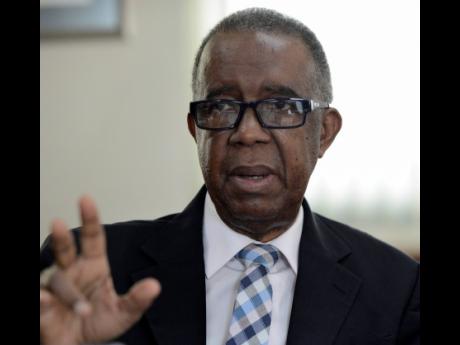TRAFFIC CHAOS
Injunction on excess fines after 2006 throws open conundrum
WESTERN BUREAU: A temporary injunction by the Supreme Court preventing the police from issuing traffic tickets in excess of fines as at 2006 has put the country in a crisis until a new law takes effect, a transportation-law expert has said. Dr...
WESTERN BUREAU:
A temporary injunction by the Supreme Court preventing the police from issuing traffic tickets in excess of fines as at 2006 has put the country in a crisis until a new law takes effect, a transportation-law expert has said.
Dr Lucien Jones, vice-chairman of the National Road Safety Council, said it is critical for the Government to pass the law before drivers become tempted to flaunt the risk of lower fines in the faces of the police.
Jones said the interim order by Justice Sonia Bertram Linton may cause offenders to ignore the attendant penalties and "continue to do as they have been doing, breaking the road traffic laws, speeding, and running the red light”.
Meanwhile, Assistant Commissioner of Police Gary McKenzie, head of the Public Safety and Traffic Enforcement Branch, told The Gleaner tersely that Commissioner of Police Antony Anderson would address the matter shortly.
Ultimate success in the court could have implications for budgetary projections of more than $220 million the Government expects to rake in from traffic fines.
“One of the possible solution to the problem, this conundrum, is a speedy implementation of the new Road Traffic Act, which has been long in coming, having been passed in Parliament three years ago,” Jones told The Gleaner on Wednesday evening.
“It can lead to chaos in the first instance, in terms of how people view the law, but we would not be unhappy if by a twist of fate, out of this comes a rapid implementation, or certainly more rapid than was intended of the new Traffic Act.”
In granting the injunction, the judge has allowed the matter to be heard as a class-action suit, similar to what the National Co-operative Society (NTCS) did when it took the Government to court and was awarded $1.8 billion by the United Kingdom Privy Council in 2013.
Maurice Housen, the claimant who filed the suit against the attorney general and the commissioner of police, said he was denied due process as set out in the Charter of Fundamental Rights and Freedoms.
There are fixed penalties for offences under the Road Traffic Act of 1938. These penalties have not been increased by Parliament or the minister of transport, but the minister of finance in 2006 and 2007, under the Provisional Collection of Taxes Act, purportedly increased these penalties. It has been argued that no such power exists.
Housen, in his claim, is asking that the provisional collection of tax (road traffic order) of 2006 and the provisional collection of tax (road traffic order) 2007 be null and avoid and have no effect.
On July 26, 2021, Housen was issued with a ticket for purportedly breaching Section 26 of the Road Traffic Act 1938 by driving 77kph in a 50kph zone. The fixed penalty written on the ticket was $5,000, but the charge should have been $800, he has argued.
The injunction is to restrain the commissioner of police and his agents or officers from issuing traffic tickets with fixed penalties in excess of those that are set out in the Road Traffic Act until the law has been amended or replaced.
The decision has been welcomed by public transport operators who say they are willing to wait up to two years to get refunds on millions of dollars collected by the Government from them via hefty traffic fines.
In a celebratory mood on Wednesday night, Egeton Newman, president of the Transport Operators and Development Sustainable Services (TODSS), said this was a precedent for hundreds of his members who have been paying large sums for traffic violations.
Newman gave an example of a young driver from St Thomas who was charged $50,000 by the court on Monday because he had a child, in addition to three adult passengers in his vehicle.
“This injunction is a big move for the public transport sector. We can earn millions if the case is won,” he stated, his voice oozing with excitement.
Minister of Finance, Dr Nigel Clarke, who is currently at the COP26 Summit in Scotland, said he needed to be updated on the matter before offering a comment.

